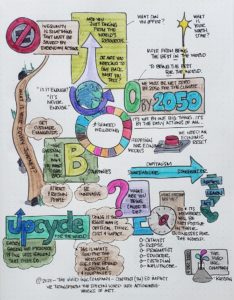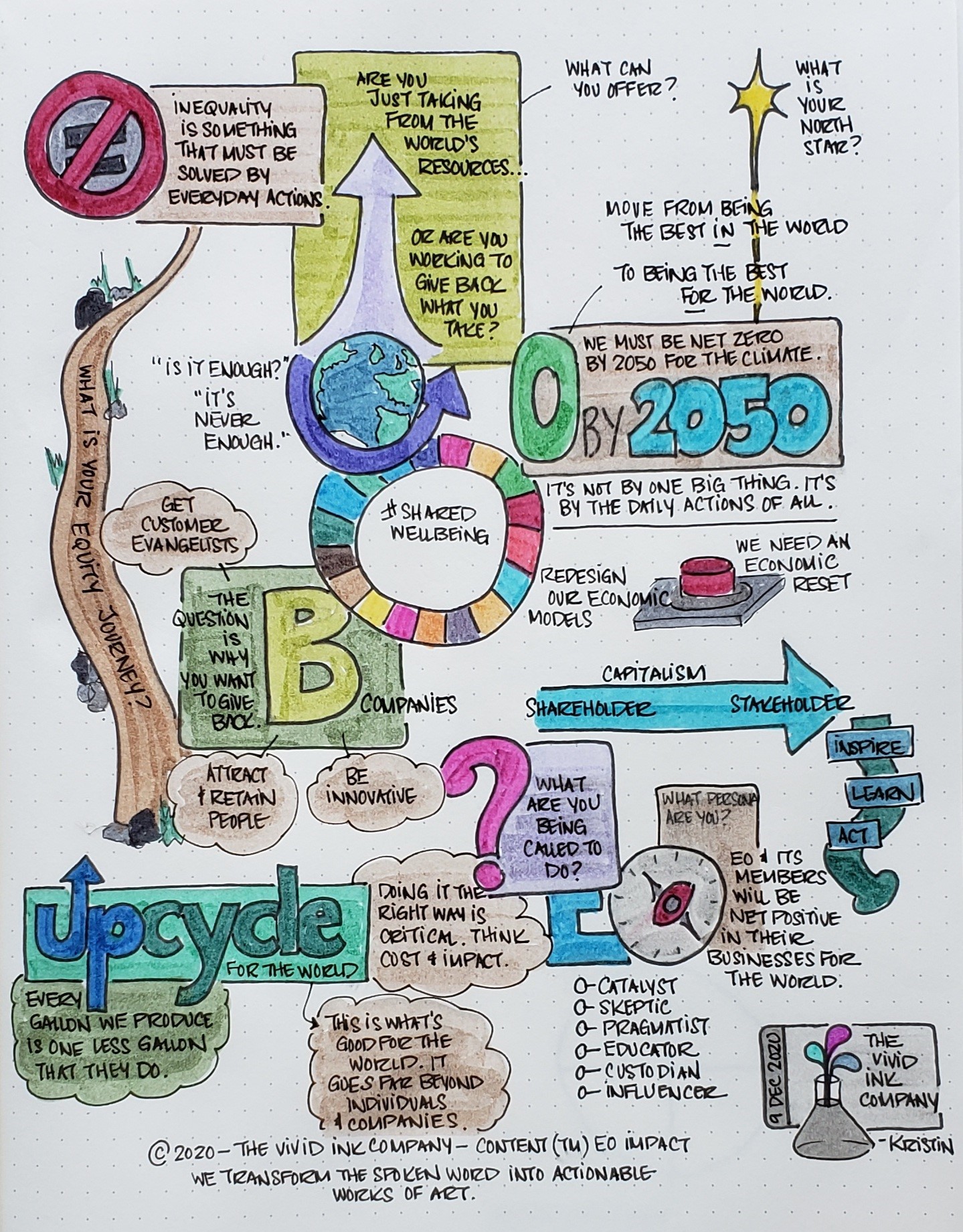Entrepreneurs are uniquely positioned to lead impactful businesses and build a sustainable future for our world, but how exactly do you start? EO Impact Day, a quarterly event series, aims to answer that question by presenting experts and providing the tools entrepreneurs need to start making the world a better place.
“EO Impact Day is gaining momentum. We’re starting important conversations between entrepreneurs and global experts around making significant changes to their businesses that benefit people, community and planet,” said Marsha Ralls, EO’s Impact Day Champion.
“As the ‘inspire’ arm of EO’s Inspire, Learn, Act series, we’re inviting and engaging members to become a part of EO’s sustainability strategy.”
 EO Impact Day “Reimagine Success” focused on our planet and the vital role businesses play in building a sustainable future. It will take drastic steps to avoid catastrophic changes to our planet, which can be done only if we reimagine “business as usual.”
EO Impact Day “Reimagine Success” focused on our planet and the vital role businesses play in building a sustainable future. It will take drastic steps to avoid catastrophic changes to our planet, which can be done only if we reimagine “business as usual.”
“As entrepreneurs, we passionately fight to overcome the challenges that obstruct our goals,” Ralls said as she welcomed EO Impact Day participants to Reimagine Success event.
“Climate change exacerbates the frequency and severity of natural disasters affecting millions of people and exposing businesses worldwide to numerous risks. What actions can businesses take to mitigate these risks and take advantage of new opportunities? What is our responsibility and how can we combat climate change?”
During the event, three keynote speakers discussed case studies and shared resources, experiences and ideas in leading sustainable organizations:
- Gonzalo Munoz, Co-founder and CEO, TriCiclos
- Jay Coen Gilbert, Co-Founder of B-Lab and Co-chair of Imperative 21
- Jennifer Case, President and CEO, New Leaf Biofuel
Speaker highlight: Gonzalo Munoz
Cristina Calvo, EO Costa Rica, introduced the first keynote speaker, Gonzalo Munoz, who shared his passion towards sustainability, the race to net zero and sustainable business transformation, while also sharing his experience as COP26 High Level Climate Champion for Chile.
Here’s a snapshot of what Gonzalo Munoz shared:
• “We have to ask ourselves the strongest, hardest, deepest questions: Is what we do good or bad for the world? Does our business make the world better or worse? If we don’t consider these questions, we risk failing to tackle the most important challenges of our lives.”
• “If the world needs to be net zero by 2050, all of us must start today. It is our moral imperative to do it now. The world is aligning. Every business, city, investor, school, university and club is invited to join. It’s a race to net-zero. The technology is there. It’s about our own determination in making capitalism work for everybody.”
• “Please join the Race to Zero. It’s the greatest way in which we can show ourselves and future generations that we understand, and are following the science to prevent a major environmental crisis.”
Speaker highlight: Jay Coen Gilbert
Next, Marsha invited Jay Coen Gilbert, Co-founder of B-Lab, the nonprofit behind the global B Corporation movement to share his journey, vision and experiences. Jay talked about B Corp certification for companies and about Imperative 21, a business-led cross-sector coalition that believes the imperative of the 21st century is to redesign our economic system to create value for all stakeholders.
Here’s a snapshot of what Jay Coen Gilbert shared:
• “The B Impact Assessment is free and confidential. It’s an incredible tool to make your business into a force for good. To make it a better place for employees, a better partner for suppliers, a better steward for the environment. It’s a learning journey that engages your full team, helps us all live into the aspirations for the kind of people and company we want to be.”
• “Instead of asking whether you need to become a B Corp, consider instead why you want to become one: To become a better company, to be a more inclusive and equitable workplace, to attract and retain the best talent―because the best talent wants their work to reflect their values. It will help you build an incredible culture of curiosity and continuous improvement and join a community of others like-minded and like-high-performing.”
• “This is the biggest trend in our lifetime: To align business with a higher purpose that’s credible and authentic – that’s what will enable you to compete in the long run.”
• “In a perfect world, all businesses would behave like B Corps. They would be competing to be not just best in the world, but best for the world.”
Speaker highlight: Jennifer Case
Dave Anderson, EO Chair-Elect, interviewed EO San Diego member, Jennifer Case, President and CEO at New Leaf Biofuel, a biodiesel refinery operating in San Diego since 2006, recognized nationally as a major player in the biodiesel space. Jennifer talked about her purpose and shared what she has accomplished through her advocacy work as well as the opportunities she sees in the future.
Here’s a snapshot of what Jennifer Case shared:
• “Biofuel is a broad term for fuel made from a contemporary biomass (such as vegetable oils or animal fats) as opposed to fossil fuels. My company makes it from used French fry oil. We sell to consumers who want to reduce the carbon intensity of the fuel they use, either because they’re required to or because they know it’s the right thing.”
• “The transportation sector is one of the largest emitters of greenhouse gases. Using biofuel reduces carbon emissions by 80% compared with petroleum. Lower income communities suffer the most from environmental degradation and air quality—in cities we see so many children with asthma and other health problems. Biodiesel contributes directly to improving the lives of children in these communities.”
• “While there’s not enough biodiesel to replace all of the petroleum powering the global economy, it’s a piece of the puzzle. About 20% of California’s petroleum demand is currently met by renewable fuels like biodiesel.”
• “Not all biofuels are created equal. Palm Oil is an example of a biofuel that does more harm than good: Clearcutting rainforest to plant the palms that make palm oil does more damage to the environment than the petroleum industry is already doing.”
Finally, sustainability consultant Yiannis Chrysostomidis, Managing Director of Sustainable Futures, EO’s sustainability strategy consultant, presented EO’s sustainability strategy. This strategy will help manage EO’s environmental and social impact and inspire EO members to engage with the sustainability agenda. Look for a future blog post detailing this important information.
How can you get involved?
The next EO Impact Day will take place in March 2021. Meanwhile, complete the interest form for EO’s Inspire, Learn, Act series to continue your EO impact journey, and connect with others on EO’s Sustainable Business Facebook group or Slack channel. You can also join the MyEO Sustainable Business group. And we encourage EO members to share your EO impact story!
As Jay Coen Gilbert reminded us: “The journey of 1,000 miles begins with a single step.” It’s time to galvanize ourselves and each other to start walking!
Categories: Best Practices HEALTH INNOVATION LEADERSHIP STRATEGY

